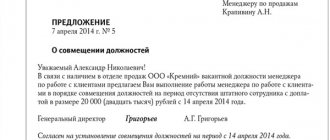The director of the organization is the financially responsible person. That is, damages can be recovered from him legally. How to do it? Let's look at it in this article.
Question: Is it possible to recover losses from the former director of an LLC in the form of fines and penalties accrued based on the results of a tax audit? Is it possible to recover damages in the form of administrative fines collected from the LLC (in particular, for violation of labor or migration laws)? At the same time, the former director has no personal interest or intent. The reason may be incorrect reflection in accounting, incorrect wording, or failure to complete documents (including by other employees of the organization reporting to the director). View answer
What kind of damages can be recovered?
Collection from the general director is carried out on the basis of paragraph 1 of Article 53.1 of the Civil Code of the Russian Federation. Instructions that damages can be recovered from the director are contained in the laws on LLCs and JSCs. However, this does not mean that any costs can be recovered from the responsible person. This can only be done in relation to expenses incurred through the fault of the general director.
How to recover losses from the director that the organization incurred due to his fault ?
This person has broad powers and is responsible for almost all areas of the company's activities. Therefore, the list of damages that can be recovered is quite wide. Consider this list:
- Transfer of money under fictitious agreements for cashing out finances.
- Placing signatures on acts of services provided, if these services were not provided.
- Unlawful increase in salary, illegal payment of bonuses.
- Exceeding the powers specified in the charter.
- There is no information about the spending of money that was taken into account.
- Purchasing property at an obviously inflated price.
- Sale of property at a reduced cost.
- Due to the fact that the general director did not transfer the documentation, the company incurred expenses for restoring accounting.
- The company fulfilled its obligations under the contract, which was not necessary.
- As a result of the tax audit, additional charges appeared or sanctions were imposed.
- The legal entity was brought to justice on the basis of the Tax Code of the Russian Federation or the Code of Administrative Offenses of the Russian Federation.
- Losses that occurred during the activities of the company under the management of this general director.
Question: Can LLC participants recover damages from the general director that arose in connection with his refusal of the organization’s claim? View answer
These are the most common types of losses, confirmed by judicial practice. Other types of losses are also possible. However, collecting these funds will be more difficult due to the lack of judicial practice.
IMPORTANT! Claims regarding losses can be brought not only against the general director, but also against a member of the company’s board of directors. They can also be addressed to members of the board of a cooperative or the manager of a unitary entity.
ATTENTION! The term “director” is disclosed in the resolution of the Plenum of the Supreme Arbitration Court No. 62 dated July 30, 2013. This is a fairly broad concept. It includes not only the CEO. This could be, for example, a member of the board of directors. However, in Russia, in most cases, management functions are assumed by one person - the general director. As a rule, it is he who concludes transactions and puts his signatures on key documents. And therefore, losses are recovered from him.
Recovery of losses from the director in bankruptcy
The procedure for collecting damages from a director in bankruptcy is not much different from the claims made in corporate disputes. The specificity of such disputes is that statements of claim are filed with the arbitration court not only by the participants of the organization, but also by creditors represented by the arbitration manager. The insolvency administrator of a legal entity in bankruptcy, first of all, acts in the interests of creditors, therefore, his claims against the former director are aimed mainly at protecting their interests. The actions of the arbitration manager to recover losses from the head of the organization are similar to the actions of the new director of the company who discovered violations committed by the previous director, which led to losses.
To recover damages from the former director, the arbitration manager must prove:
- violations committed by the director
- existence of losses
- cause-and-effect relationship between the director’s actions and losses
If the court satisfies the application for recovery of losses from the director, the director is obliged to compensate them to the legal entity. The amounts collected from the director are subject to inclusion in the bankruptcy estate of the legal entity.
In what cases should you go to court?
The CEO bears full responsibility. The basis is Article 277 of the Labor Code of the Russian Federation. Simply put, the CEO is obliged to compensate for all losses. The amount of compensation does not depend on the manager’s salary or the actual period of tenure as director.
However, compensation for losses can only be achieved when all the conditions for this are in place. In particular, it is necessary to prove the fact of causing the loss and its size. The basis is paragraph 2 of Article 15 of the Civil Code of the Russian Federation. But it is not always possible to accurately determine the amount of losses. But this, in accordance with paragraph 1 of Article 15 of the Civil Code of the Russian Federation, cannot become a basis for refusal to initiate a lawsuit. If the amount is unknown, it will be determined by the court based on all the circumstances. In this case, the principle of fairness is used.
The plaintiff must take into account that only actual damages can be recovered. Lost profits cannot be recovered. The corresponding rule is contained in Article 238 of the Labor Code of the Russian Federation. Let's look at an example. At the initiative of the general director, a deal that could have brought 500,000 rubles was terminated. This half a million cannot be recovered.
If a company suffers a loss, it can be compensated in various ways. You can either file a claim against the director, or make claims against suppliers and other participants in the transaction. If one of the refund methods has already been implemented (for example, the product was returned), it will not be possible to recover funds from the manager.
Statute of limitations on the case
The statute of limitations for cases of collection of funds from the general director is standard. This is 3 years (based on Article 196 of the Civil Code of the Russian Federation). Article 197 of the Civil Code of the Russian Federation states that the standard period is valid in all situations unless separate regulations apply to them.
This period is determined not from the moment of the violation committed by the manager. It is counted from the date on which the loss became known. As a rule, a violation is detected when the director is replaced or the statements are approved.
In most cases, claims against the general director are filed in court when the employment relationship with him has already been terminated. However, penalties can be brought against the manager even if he continues to work in the company.
IMPORTANT! The general director may be held not only financially liable, but also criminally liable. The corresponding provision is contained in Article 90 of the Code of Criminal Procedure of the Russian Federation.
Assessing business prospects
The grounds for recovery are the presence of evidence that the loss arose as a result of dishonest or unreasonable actions of the general director or his inaction. That is, it is necessary to establish either the fact of bad faith, or the fact of unreasonable actions, or the fact of inaction. However, “bad faith” and “unreasonableness” are rather vague definitions. Let's look at what exactly is meant by them.
Signs of a CEO’s dishonesty:
- There was a conflict between the interests of the manager and the interests of the legal entity.
- The manager hid information about the completed transaction from the legal entity or provided false data.
- Conducting a transaction without approval, if it is required on the basis of laws or charter.
- The director, removed from his position, does not transfer documents to the legal entity, which leads to a loss.
- The general director, taking actions, understood that they were contrary to the interests of the legal entity. For example, he made a deal on obviously losing terms.
Actions are considered unreasonable in the following situations:
- Making an important decision in the absence of relevant information that matters.
- The director did not take action to obtain information necessary for business activity.
- A transaction without performing procedures that are required either by law or by business practice.
The lists under consideration are not exhaustive, and the court may find other actions unreasonable or unconscionable.
FOR YOUR INFORMATION! Cases related to collection have an interesting nuance. In particular, the burden of proof lies not with the plaintiff, as usual, but with the accused. If the director does not explain his actions in any way to the court, this may be considered bad faith. That is, he cannot simply refuse to testify.
Recovery of damages from management
Who is to blame for the company's losses? Sometimes answering this question is not so simple, because there is a simultaneous influence of a number of factors. This is the economic situation in the country, and fluctuations in supply/demand in a particular industry of business activity, and maybe the work of unscrupulous competitors. But still, the main role in the fate of the company is traditionally given to management. Often, the success or failure of a business depends on the right decisions of the manager or board of directors. Can a director be personally liable for company losses? Yes, the law provides for the right of shareholders or a new manager to call a negligent boss to account; to do this, they should file a claim in an arbitration court. Let's look at this situation from each side.
Grounds for recovery of damages from management
The law recognizes the manager’s right to make mistakes, formally recognizing that any commercial activity is, in one way or another, associated with risk. Even such a concept as “limits of ordinary business risk” has been introduced. If the manager’s decisions fall within these limits, then there are no grounds for collecting damages from him. Who has the burden of proof in this type of arbitration? Formally, it is on the applicant, since it is he who must provide the grounds for starting the review. However, the manager has the right to give explanations for his actions and, if he does not take full advantage of it, the court may oblige him to prove his innocence. Failure to cope with this task, the manager may be found guilty of the losses incurred, with all the consequences arising from this decision. What does the director have to prove? Firstly, your integrity. If the manager knew before the transaction was concluded that it would become unprofitable for the company, then well-founded claims may arise against him. Was personal gain the basis for making a business decision? Establishing such a fact will definitely tilt the opinion of the arbitrators in favor of the applicant. The second circumstance that the manager accused of causing damage to the enterprise will need to prove is the reasonableness of his actions. Perhaps this concept will seem too general and lacking specifics to the reader, but in fact it has its own stable criteria. A reasonable leader provides some reasoning for his decisions in advance, which you can always rely on. An example of a very reasonable action by a director is the creation of internal decision-making procedures and strict compliance with their requirements. Following an established order involves a larger number of participants in the decision-making process and thus, in some way, divides responsibility among them. But the director cannot be held responsible for the negligence of employees. If the company’s lawyer has not found out that the counterparty company is a “fly-by-night company,” then recovery of damages from management will be impossible.
Bringing a legal entity to responsibility
For transactions made in personal interests and causing a loss to the company, the manager is responsible - we found this out. But if the problem is to hold a legal entity liable, will the director be found guilty? For example, let's take tax claims from regulatory authorities. By resorting to tax optimization methods, the manager formally acts not in personal interests, but in the interests of society and its shareholders. This means that even in cases where the methods were declared unacceptable by regulatory authorities and the court, it will be difficult to recover damages personally from the director . We should not forget that the responsibility of the manager for tax evasion by the enterprise lies in the plane of criminal law, and not arbitration law. However, there are situations in which it is possible to compensate the losses incurred by the company from administrative or tax penalties personally from the director. It is impossible to formulate general rules or recommendations here and it is necessary to analyze each situation separately.
Amount of losses subject to compensation
Losses incurred by an enterprise as a result of erroneous actions of a manager include both direct and indirect losses, including lost profits. Sometimes situations arise when it is difficult to unambiguously assess the extent of losses caused. This is very important, as it determines the amount of the claim, as well as the amount of state duty paid. If losses are calculated incorrectly, the court may refuse to recover them in whole or in part. The plaintiff is obliged to prove during the process that the losses actually occurred. If during the consideration of the case it turns out that it is not possible to determine the exact amount of losses, then it is established at the discretion of the court.
Consequences of decisions approved by the company’s management bodies
Recovery of damages from management , if the decision in question has gone through the established procedure for approval by shareholders, oddly enough, is also possible. The fact is that the law establishes the independence of the sole manager in decisions made. In other words, the director always has the opportunity to resist the will of the participants if there are grounds for doing so. One of the options for behavior in such a situation may be to begin the abdication procedure. On the other hand, shareholders are also responsible for the consequences of the transaction if they voted positively during its approval.
Release from liability for damages
Even if it is proven that the manager did not show due reasonableness and/or good faith, as a result of which the company suffered losses, there are situations when he is released from the obligation to compensate for damages. For example, if the transaction in question was declared invalid by the time the decision was made, and the company compensated for its losses. On the other hand, the company can simultaneously influence the person responsible for causing the loss (whether it is a counterparty or an employee) and recover damages from management .
Advice to the head of the company
A director who acts in the interests of the company he heads and conscientiously performs his duties is not threatened with recovery of damages . However, it would not be amiss to promptly develop internal instructions governing decision-making and their approval. It is worth considering the issue of bonuses for yourself especially carefully. It should also
stay away from conflicts between shareholders and, if possible, not take sides in them. The statute of limitations during which it is possible to recover damages from management is quite long. Leaving your post to “cover your tracks” is pointless. The arbitration court also accepts claims against former managers of the company. Law enforcement practice differs in different regions, but in general, cases of this kind are resolved in favor of the applicant in less than half of the cases.
Advice for representatives of a legal entity
As follows from the above, the mere presence of losses is not enough to hold a manager liable. On the other hand, if there are grounds for claims against management, it is necessary to pay special attention to their documentation. It may be advisable to seek the assistance of a qualified arbitration lawyer. Violations of the accepted procedure for approving a transaction are a sufficient signal to check all the circumstances in more detail and prepare an appeal to arbitration. If you can find out that there was a conflict of interest between the objectives of society and the benefit of the manager, then you don’t have to worry about the outcome of the process. It is also worth warning shareholders against attempts to settle personal scores by collecting losses from management. This process requires significant investments and takes a lot of time (on average 4-6 months), and the result in this case is not at all guaranteed.
How to recover damages from the CEO
Let's consider the general procedure for collecting losses from a director:
- Drawing up a claim, which sets out all the circumstances of the case, argues the plaintiff’s position with references to the laws. In the application, it is advisable to indicate the amount of loss, as well as justify its calculation.
- Collection of documents that confirm the position of the plaintiff (for example, a document on the conclusion of a transaction due to which the legal entity suffered losses).
- Payment of state duty.
- Submitting a claim, documents and a receipt for payment of fees to the court at the defendant’s address.
The success of the trial is determined by the arguments presented by the plaintiff. If it is found unconvincing, the case is terminated.
Reasons for collecting damages from the head of the organization
- illegal transfer of funds under fictitious agreements;
- when signing documents for work and services that are not actually performed or provided;
- the existence of an unconfirmed expenditure of funds;
- illegally increasing one’s own wages, issuing bonuses, including to other employees;
- purchasing real estate at a significantly inflated price;
- execution of an agreement that the LLC did not need;
- upon compensation of sanctions or additional charges based on the results of audits by the tax authority;
- if the organization incurs losses due to improper conduct of business activities by this person.
The question of how long it takes to recover damages from a director can only be answered by an experienced arbitration lawyer, since there are quite a lot of nuances in this issue. It is established by law that the period for collecting damages from a member of the company is the period from the date of the crime that took place and has already been proven. And until the sentence comes into force.
Those. we can conclude that the director is held accountable both at the time of fulfillment of his obligations and after their termination, but for the period of his work.
USEFUL: watch a video with advice from a lawyer on arbitration cases and write a question on your topic in the comments of the video on the YouTube channel










